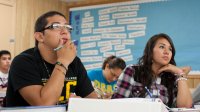Let’s Start This Year by Focusing on Learning Gains
There’s a lot of talk about learning loss, but teachers can guide students to reflect on all the ways they’ve grown during the pandemic.
Your content has been saved!
Go to My Saved Content.“Don’t ever let anyone put an asterisk on this year.” That’s what I told my graduating seniors at the end of one of the most difficult years of teaching I’ve had in my career of more than 14 years. It would be easy for any employer or college admissions board to reduce last year to a footnote: “Class of 2021. That was a pandemic year. You didn’t get a ‘normal’ education.” True, it was anything but normal. But the 2020–21 scholastic year doesn’t need a disclaimer. It needs a celebration.
Instead of lamenting learning loss or stressing about how far behind the pandemic has put you in your curriculum, and students in their education, I encourage you to start this school year asking students to reflect on how they grew last year because of the pandemic. The following is a lesson I taught at the end of the 2020–21 school year that could just as easily be a beginning-of-the-year activity.
A Reflection on Learning
I asked students to read the New York Times article “What Students Are Saying About ‘Learning Loss’ During the Pandemic” to get their perspective on the article’s assessment of remote learning. I also wanted to find out if they had personal supporting evidence or if we could offer up a counter-narrative to the idea of learning loss. The students then shared a statement that resonated with them.
When researchers and stakeholders talk about learning loss, they’re talking about learning they can measure—in other words, hard skills like literacy and mathematics. Soft skills, on the other hand, are more difficult to measure with standardized testing, but they’re the interpersonal skills that all employers are looking for, including communication, teamwork, and adaptability. After we viewed the video “Hard Skills vs. Soft Skills,” which does a nice job of succinctly defining the terms, I asked students to discuss the following questions:
- When we talk about learning loss during Covid-19, which kind of skills are we measuring, hard skills or soft skills?
- How did pandemic learning (in any of its forms) help you gain or improve soft skills?
Brainstorm Examples of Pandemic Soft Skill Development
I came up with a list of five soft skills that students developed and were able to illustrate with specific examples from their lives during the pandemic: flexibility or adaptability, time management, communication or teamwork, self-motivation or goal-setting, and responsibility or independence.
This brainstorm was most successful when I started by asking my classes to count how many versions of school we’d had since March 2020. Depending on if and when their families chose virtual or in person, answers ranged from two to six versions. Naming these versions not only gave students a chance to brag but helped them identify how each adaptation was an opportunity to develop more soft skills. Here’s a Jamboard example from one of my classes.
Close With an Individual Written Reflection
After reading each other’s ideas on Jamboard, we closed this lesson with an individual written response. Students chose a soft skill they had improved the most and responded to the typical interview question, “Tell me about a time when you faced a challenge.”
- “I really grew in responsibility and independence this year because I’ve had to be in charge of all my schoolwork. I was responsible for my own schedule, and knowing when to log in to class without bells in school or teachers telling me to. I also had to practice independence a lot more because being online meant that I couldn’t talk to teachers or other students in person. If I was confused about something, I either had to be responsible during class and get help, or I had to independently figure it out and find my own resources for help.”
- “Right at the start of the pandemic, I lost my lacrosse season. I was very upset and had no motivation or reason to do school. I took some time to think and thought what good would it do for me to fail out the rest of this year. So I stuck to my roots and managed a 4.0 the rest of my junior year.”
As a beginning-of-the-year activity, students can take this one step further and explain how they can tap into the soft skills they developed last year in order to succeed this year.
Someday, learning through Covid-19 will be our students’ “When I was your age…” story. They may not have had to walk to school uphill both ways, but last year my students showed up to Zoom without the aid of a Pavlovian bell. They used email to ask questions and notify me of absences. They made themselves breakfast and lunch. They exhibited patience and persistence through technological glitches and teacher learning curves.
It was difficult and messy, and results varied considerably, but pandemic learning forced many students to become more independent, and it created conditions for developing the communication skills, adaptability, and resilience that employers and colleges are looking for.
It would be a shame to return to normal without acknowledging any growth that occurred during the pandemic. A reflection that helps us learn more about our students and celebrate their accomplishments and resilience is the perfect way to begin this year.
